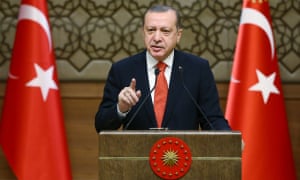- Despite the pressures there remains a vivid civil society in Turkey, aspiring to democracy, openness and tolerance. It deserves our support
The Guardian
Editorial

The massacre of 39 people in a New Year attack on Istanbul’s Reina nightclub, which Islamic State has claimed responsibility for, has plunged Turkey into new depths of grief and anxiety. It turned a festive night into a bloodbath, with dancers and partygoers felled by automatic rifle fire, echoing the November 2015 Bataclan attack in Paris. The world should express its solidarity with the victims as staunchly and vocally as it did with France’s.
But Turkey is a country racked by multiple traumas. A shaken nation lives in the fear that more violence may befall it in 2017, as it grapples with internal strife and the fallout from war and chaos in the Middle East. The trauma of terrorism exists alongside that of large-scale political repression in the aftermath of July’s coup attempt, as well as tensions created by coping (often remarkably, at a human level) with the arrival of an estimated 3 million refugees in recent years. These forces are of course of different natures and dimensions; they should not be conflated with one another, nor automatically connected. But to grasp the immense pressure Turkish citizens are under, it is important to keep them all in mind. In any country, any one of these would be a massive challenge; taken together, they amount to a rare test, putting a highly polarised nation at an important, possibly decisive, crossroads.
That the Reina nightclub attack occurred in a city of rich, cosmopolitan history and numerous tourist sites, and that the victims were of 14 different nationalities, only enhanced the global resonance of the event. Isis said a “heroic soldier of the caliphate” had targeted a place where “Christians were celebrating their pagan feast”. The assailant, the group said, had acted “in revenge for God’s religion” because Turkey was “the servant of the cross”. In the run-up to the attack the Turkish army had been heavily engaged in northern Syria, where it battles Isis as well as Kurdish armed groups.
Turkey’s recent policy shift in the Middle East, marked by a sudden alignment with Russia in facilitating the fall of rebel-held Aleppo, will have increasingly placed it in the firing line of a group that likes to claim it defends Sunni Muslim populations – all the while persecuting them. But the danger that Isis represents for Turkey predated this change in alliances, the principal motivation for which can be found in Ankara’s determination to curtail Kurdish territorial ambitions throughout the region.
The Istanbul tragedy came after a long list of murderous attacks in Turkey, making it the western country (as a Nato member with EU aspirations) that has statistically suffered the most from terrorism in recent years: more than 400 people have died since mid-2015 in attacks attributed both to Isis and to Kurdish groups. That’s more than anything France, Belgium, Germany and the US have had to counter since the creation of Isis. This fact has perhaps at times been overlooked: much of the comment on Turkey in recent months has understandably concentrated on Recep Tayyip Erdogan’s brutal methods against any form of dissent – with political repression indeed reaching new heights since the failed coup attempt.
Turkey’s paranoid, autocratic president and his administration hardly warrant sympathy. More than 140 writers, journalists and intellectuals are imprisoned. Social media users are increasingly being investigated. Legal proceedings have begun against 80,000 people nationwide, in what amounts to massive purges. Last week another political trial got under way, involving the novelist Asli Erdogan. Turkey’s relations with western allies have been strained as a result of the president’s human rights record as well as policy divergences in the Middle East.
It is easy, when looking at a country in the grip of authoritarianism, to see just the despot and not the millions of citizens who populate the land in all their diversity and with all their aspirations. One man captures all the attention because he is deemed to control so much – and, indeed, his power is unrelenting. But as a nation mourns its dead, one way to manifest solidarity is to remember that despite the pressures there remains a vivid civil society in Turkey, aspiring to democracy, openness and tolerance, not hatred and divisiveness, and it is showing much courage. The scale of the country’s simultaneous and multiple traumas make that spirit of resistance all the more admirable, especially when tragedy strikes. This citizens’ courage deserves not just our empathy but our active support.


